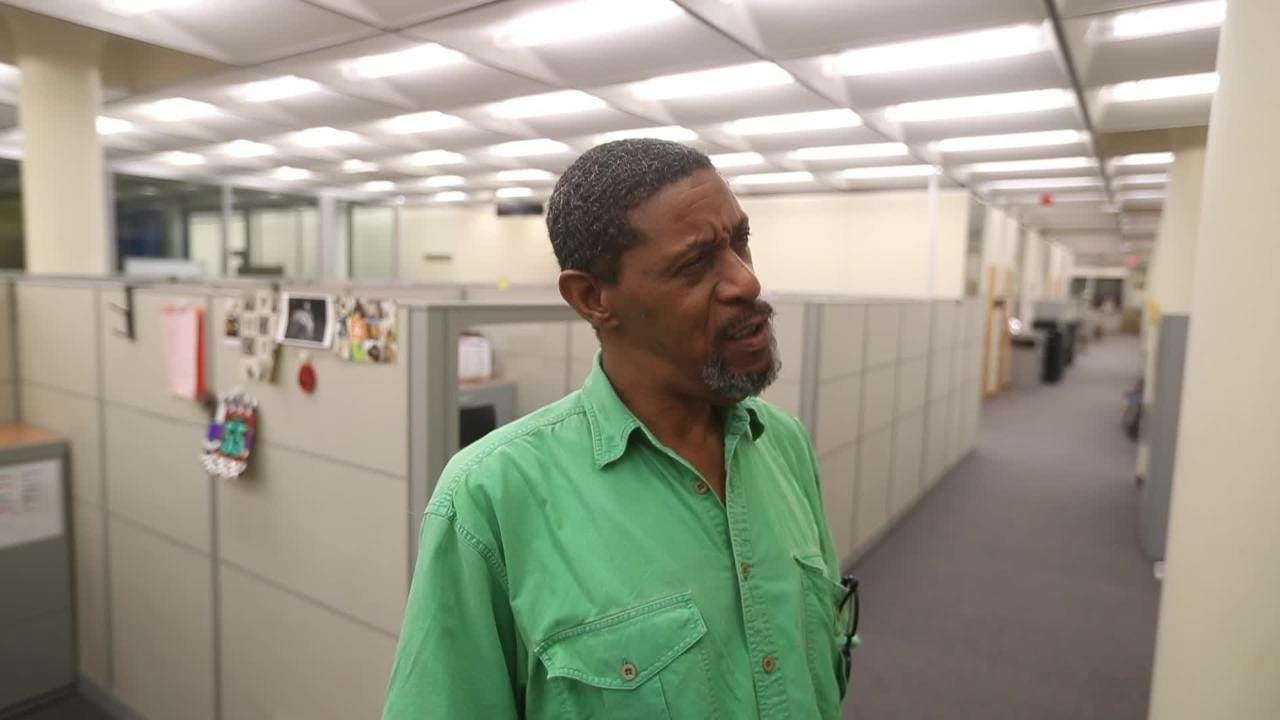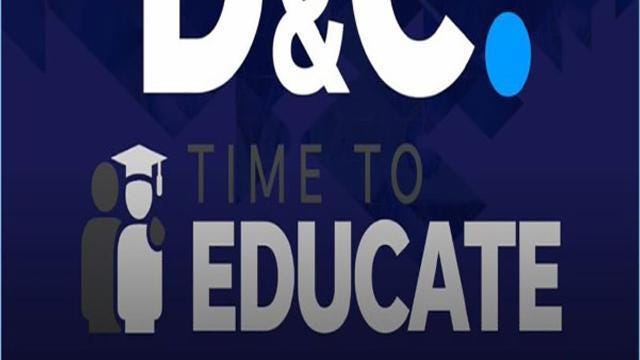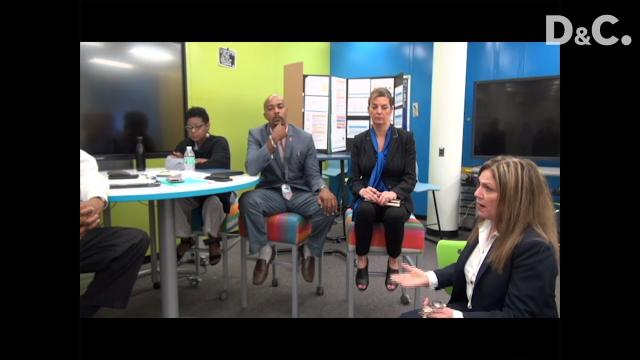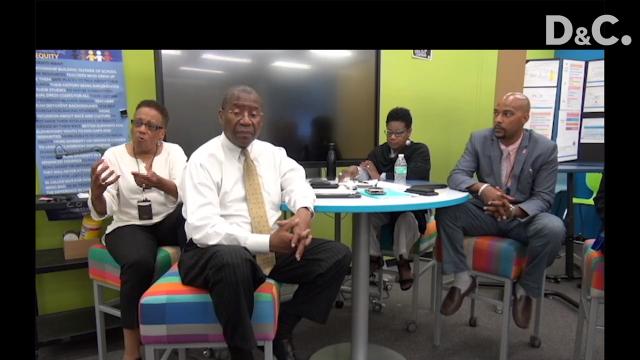Change in district mindset over confronting racism cause for cautious optimism, activist says
Editor's note: The Time To Educate reporting agenda is directed by the community, and aims to highlight potential actionable solutions to the city's education crisis. This story was prompted by the question from Howard Eagle, "What is being done to address widespread, entrenched, individual, institutional, and structural racism in the Rochester City School District?" Eagle, a former RCSD teacher and longtime anti-racism advocate, believes that addressing racism is at the heart of improving the district's performance.
The Racial Equity Action and Leadership meeting had passed the two-hour mark. In the superintendent's conference room at Rochester City School District headquarters, people were getting punchy.
The group is designed as a forum for district leaders and the community to work together on issues of race, and even after several months of meetings it was very much a work in progress.
A discussion about scheduling devolved into questions about commitment to the work. Rabbit holes were dug and dived into. There was sighing.
"Look," said Cecilia Golden, deputy superintendent for teaching and learning. "I don't think anyone in this room would deny that we have a racial equity issue."
No one in the room did deny it — neither superintendent Barbara Deane-Williams nor any of her top cabinet members. In fact, it is now unremarkable to hear top-ranking administrators refer to the district as an institution rooted in white supremacy or dogged by racism against black students.
That top-level consensus is a change in the last five years. For most of the previous 50 years, RCSD had concentrated its efforts on helping students persist through the effects of racism rather than confronting it directly.

"Racism has existed in this country long before you and I were born, and it likely will continue after we pass from this good earth," School Board President Van White said. "But our legacy is what we teach our students and what we share with them. ... I think the district has gotten reasonably aggressive in (instituting) training on the role of racial bias in the decisions we make."
More: Teacher diversity a struggle for schools
Among the key factors in that transformation: intensive and ongoing consulting work from Joy DeGruy, author of the book Post Traumatic Slave Syndrome and a nationally recognized expert in anti-racism work; a 2014 report showing stark racial disproportionality in suspensions; a cadre of high-ranking administrators with a passion for the topic, and a school board that has supported it.
"I’ve seen this kind of process over and over again," Eagle said. "This is not the first time we’ve had this discussion. But I’ll admit, it’s the first time I’ve seen it at this level. So I'm cautiously optimistic."
The important thing, of course, are the actions the district is taking to put that conviction into action. Those steps fall into two categories.
Diverse staffing a constant challenge
Like nearly every city outside the former Confederacy, Rochester has a distinct shortage of black teachers and administrators compared to its student demographics, although its numbers are actually better than many comparable cities. Here, 75 percent of teachers are white, 13 percent are black and 6 percent are Hispanic.
By comparison, students are 10 percent white, 58 percent black and 28 percent Hispanic.
In Syracuse, 88 percent of teachers are white, and in Buffalo, 86 percent.
"The issue of hiring diversity in the teacher ranks is a national issue, not just a Rochester issue," Chief of Human Capital Resources Harry Kennedy said.
District representatives have made dozens of recruiting trips to historically black colleges and universities and Puerto Rico; advertised in black-owned media; and encouraged substitute teachers and paraprofessionals to get a teaching certificate, a strategy that netted them 30 black and Hispanic teachers in 2016-17.
With all those efforts, though, the district's new teacher hires through April 2018 were somehow less diverse than the existing teacher pool — 20.1 percent non-white, compared to the current 25.1 percent non-white. (Non-teacher hires did show a trend toward greater diversity.)

"The challenges continue — I believe we have to continue to go to Puerto Rico, to the black colleges, because it's about relationships," Kennedy said. "Before you can recruit people, you have to establish relationships so they feel they're wanted and can succeed here in Rochester."
Considering the hyper-competitive national job market, the district is also looking to its own students to boost its teacher ranks, in particular through the Teaching and Learning Institute at East High School. TLI students learn basic elements of curriculum design and pedagogy while still in high school; Kennedy said they then receive an open-ended job offer for when they finish college.
The district is now looking to expand that program to other schools. But growing its own teachers is made more challenging when only 47 percent of black students graduate with a Regents diploma within six years and an even smaller percentage complete four years of college.
In addition, Eagle alleges a disconnect between district-level hiring strategies and building-level staffing practices; in other words, even when black teachers are hired, individual schools sometimes decline to accept them.
District data shows wide disparities among buildings in terms of teacher diversity. Abraham Lincoln School 22 on Norton Street, for example, has 19 black and Hispanic teachers along with 34 white ones. Francis Parker School 23 in the Park Avenue neighborhood and Charles Carroll School 46 in the Browncroft neighborhood, meanwhile, have zero black or Hispanic teachers.
Kennedy responded only that the district "monitor(s) building level processes to remove obstacles that may be presented," and contacts the principal or school chief "if we suspect any violations and/or racial bias being directed toward our new recruits."
Mandated or voluntary anti-racism training?
Whatever race the teachers are, the district has a continuing responsibility to provide them with professional development. That is the other main tenet of anti-racism work.
The district, working with DeGruy and the Rochester Teacher Center, has developed an array of educational materials for teachers on implicit bias and culturally responsive curriculum. For at least the last year, every teacher in the district has gone through some of that training during regularly scheduled professional development days, Deane-Williams said.
Beginning in September, every new hire to the district will be required to go through implicit bias training as a requisite for employment.

For Eagle and his supporters, a commitment to addressing "implicit bias" is lacking. They believe the district cannot address racism while avoiding the word "racism" itself, and the negative feelings it may stir in white teachers, and they do not believe periodic attention on superintendent's conference days will suffice.
"A fundamental issue involved in all this is whether or not we’re going to challenge white people’s fragility," he said. The term "white fragility" refers to white people's defensive reaction when confronted by evidence of racial injustice.
Don't say 'anti-racism'
Deane-Williams said she does not object to using the term; Eagle has identified Rochester Teachers Association President Adam Urbanski as the main impediment to progress and accuses him of protecting his white constituents at the expense of black students.
Urbanski denied the charge. He pointed to the RTA-directed Rochester Teacher Center, which focuses intensively on pedagogy for children of color, and which Eagle dismisses as being "as ineffective as it possibly could be."
"Here’s where the difference is: Howard Eagle wants RTA to support compulsory anti-racism professional development for teachers," Urbanski said. "What I have said to him is, phrasing it in this way will appear to teachers as accusatory. Teachers would not be eager to become involved as they would be if we phrase it as the need for teachers to know their students and acknowledge implicit bias and racism as a reality. ...
"I think we want the same thing, but he wants to frame it in a way that I believe will become an impediment to the engagement of teachers."
While teachers are part of the team that creates professional development materials, neither they nor the union have contractual veto power over specific topics, Deane-Williams and Urbanski said. Nonetheless, the union's formidable political presence gives it practical prowess beyond what exists in the contract, and it does have a say in the quantity of professional development time allotted.
Deputy Superintendent Cecilia Golden echoed Urbanski in saying that the term "anti-racist" is needlessly inflammatory.
"Our job is to help people understand how their perspectives and socialization might have influenced how they view other people," she said. "And we can do that without saying: 'If you’re white in this country, you’re probably a racist.' And that may be true. … But if I can’t (talk about) that in a way that encourages you to listen and do self-reflection, then we’re not going to get to the goal we have to have, and that is relationship-building."

Eagle responded: "This is not about pointing to individuals and saying they’re racist. That's simple-minded. ... This is about asking: 'Do you understand your role in continuing to perpetuate the racist reality that this institution functions in?'"
Two main areas where racism manifests is in curriculum and discipline. Black advocates have long maintained, for example, that American and world history are traditionally taught in a way that minimizes the contributions of Africans and their descendants.
The position of director of Afro-African American Studies sat vacant for two years but recently was filled with Jason Willis, a Rochester native. His top priority will be examining the curriculum to ensure it is culturally responsive.
"We need to (not just) make sure the curriculum is sound and reflective of history, but also (consider) the relationships our young folks and teachers are going to need to have with the material to utilize it well," he said. "It doesn’t have to be something grandiose, but the student needs to be able to see himself in the work. … We’ll assess that job based on how much they learn."
As for suspensions, they are down sharply from four years ago and have continued to fall each year in most schools. It has been a striking success on paper, though some teachers warn it has come at the cost of lesser control in the classroom. The implementation of restorative practices meant to head off suspensions, while highly effective in some schools, has been gradual and uneven.
Years of intensive work on racism still ahead
In theory, the Racial Equity Action and Leadership team, composed of district and community leaders, is the ideal vehicle for much of the work on racism — for instance, Eagle said, determining how often teachers can have professional development time and how to use it.
In practice, though, it has done more recently to exacerbate tension. After Deputy Superintendent Bo Wright, who had been leading the team, left to become superintendent in Rush-Henrietta, a meeting was canceled without notice. That led to another round of recriminations and accusations, with Eagle leading the charge.
Even in the best-case scenario, all people involved recognize that the district has years of intensive work ahead of it.
"The most important part is that it actually gets done," board member Natalie Sheppard said. "When we talk about the curriculum or the work that needs to get done regarding racial equity — we can talk until we’re blue in the face, but if people don’t buy into the idea they’re not going to do it, and that has been the case historically in our district."
Indeed, history offers little encouragement. The question of racism versus black children in Rochester schools is exactly as old as the education of those black children, which began 200 years ago this year.
That is when Austin Steward, an emancipated slave and Rochester's first black businessman, opened a rudimentary, short-lived Sunday school for "the poor and despised colored children." It lasted only a few months before closing from lack of interest.
He wrote in his autobiography: "So strong was the prejudice then existing against the colored people, that very few of the negroes seemed to have any courage or ambition to rise from the abject degradation in which the estimation of the white man had placed them."
JMURPHY7@Gannett.com